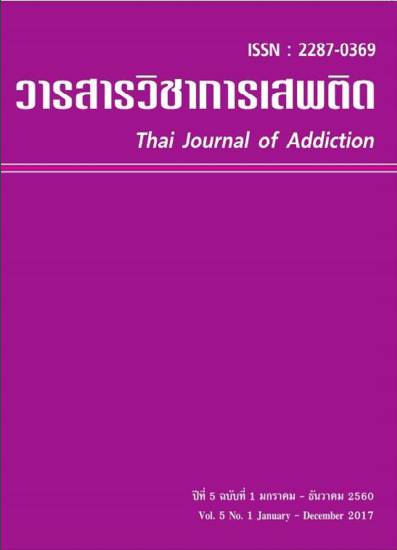The Effect of Cognitive Behavior Therapy on Relapse Prevention of Methamphetamine dependence among In-patients
Keywords:
Cognitive behavioral therapy, relapse prevention, Methamphetamine dependence, In-patientsAbstract
This research was designed as Quasi – experimental design (Two group
pretest – posttest and follow up). The purpose of this study was to examine the result of cognitive behavioral therapy program for early relapse prevention. The participants consisted of 200 methamphetamine-dependent patients who were admitted in Thanyarak Institute. The patients were randomly assigned into experimental and control groups. There were 110 patients in experimental group, and 90 in control group. The patients in experimental group received cognitive-behavioral therapy program (CBT). Which the patients received one time of CBT in the preparation before treatment phase, 7 times in the detoxification phase, 10 times in the rehabilitation phase and 4 times of booster session CBT in the follow up phase which was developed by the researcher. The data were collected for three times: in the detoxification phase, the rehabilitation phase and the follow up in second week, 1,2 and 3 month, respectively. The instruments in the study were questionnaires comprising of 2 parts; intention to early relapse prevention and self-efficacy to early relapse prevention. Additionally; There was also a methamphetamine urine examination. The data were analyzed by utilizing t-test and Fisher’s Exact test.
The result were that after the program in the detoxification phase and the rehabilitation phase, the experimental group had more intention on relapse prevention than control group. However self-efficacy of the experimental group and control group was not statistically different. The follow up assessments in the 2nd week and 1st month showed that the number of patients in experimental group and control group were not statistically different on relapse prevention. However the 2nd month and the 3rd month revealed that the number of relapse patients in experimental group was less than those of control group.
References
2. สถาบันธัญญารักษ์. สถิติการรักษายาเสพติดแบบผู้ป่วยใน. ปทุมธานี : สถาบันธัญญารักษ์; 2557.
3. Witkiewitz, Katie.; & Marlatt, Alan G. Relapse Prevention for Alcohol and Drug Problems. American Psychologist 2004. 59; 224-235.
4. ทิพาวดี เอมะวรรธนะ. จิตวิทยาการปรึกษาสำหรับผู้ติดยาเสพติด. กรุงเทพฯ: สำนักพิมพ์มหาวิทยาลัยธรรมศาสตร์; 2548.
5. Phukao, Darunee. Development and Evaluation of a Culturally Appropriate Treatment Program for People with Alcohol Use Disorders in Thailand. Dissertation, Ph.D. Queensland : University of Queensland. Photocopied; 2006.
6. Beck, Aaron T. et al. Cognitive Therapy of Substance Abuse. USA.: The Guilford Press; 1993.
7. สุกุมา แสงเดือนฉาย. ผลของโปรแกรมการบำบัดความคิดและพฤติกรรมร่วมกับแรงสนับสนุนทางสังคมที่มีต่อความพร้อมที่จะป้องกันการติดซ้ำและพฤติกรรมการไม่ติดซ้ำของผู้ป่วยสุรา. ปริญญานิพนธ์ (วิจัยพฤติกรรมศาสตร์ประยุกต์). กรุงเทพฯ: บัณฑิตวิทยาลัย มหาวิทยาลัยศรีนครินทรวิโรฒ; 2554.
8. ฉวีวรรณ ปัญจบุศย์ และสุกุมา แสงเดือนฉาย. ผลของโปรแกรมการบำบัดความคิดและพฤติกรรมเพื่อป้องกันการติดซ้ำของผู้ป่วยติดเมทแอมเฟตามีน. ปทุมธานี: กลุ่มภารกิจบริการวิชาการ
สถาบันธัญญารักษ์; 2556.
9. สีอรุณ แหลมภู่. ผลของโปรแกรมเสริมสร้างแรงจูงใจภายในต่อแรงจูงใจและการเข้ารับการฟื้นฟู สมรรถภาพของผู้ติดสารเสพติดในสถานบำบัดยาเสพติดแห่งหนึ่ง ในจังหวัดปทุมธานี. ปริญญา
นิพนธ์ (การพยาบาลสุขภาพจิตและจิตเวช). ปทุมธานี: บัณฑิตวิทยาลัย. มหาวิทยาลัยธรรมศาสตร์; 2554.
10. Reeve Johnmarshall. Understanding Motivation and Emotion. Fort Worth, TX: Harcourt College Publishers; 2001.
11. Ajzen, I., Fishbein, M. Understanding Attitudes and Predicting Social Behavior. Englewood Cliffs, N.J.: Prentice-Hall; 1980.
12. U.S. Department of Health and Human Services. Treatment for Stimulant Use Disorder. Rockvillell, MD: Department of Health and Human Services; 1999.
13. Bandura, Albert. Social Foundation of Thought and Action: A Social Cognitive
Theory. Englewood Cliffs, New Jersey: Rrentice-Hall; 1986.
14. Marlatt, Alan G. Taxonomy of High-risk Situations for Alcohol Relapse: Evolution and Development of a Cognitive-Behavioral Model. Addiction 1996. 91(Supplement):
37-49.
15. ประภาเพ็ญ สุวรรณ. ทัศนคติ: การวัดการเปลี่ยนแปลงและพฤติกรรมอนามัย. กรุงเทพ:
พีระพัฒนา; 2525.
16. O’ Donohue, William., Fisher, Jane E., Hayes, Steven C. Cognitive Behavior
Therapy : Applying Empirically Supported Techniques in Your Practice.
New Jersey : John Wiley & Sons; 2003.



